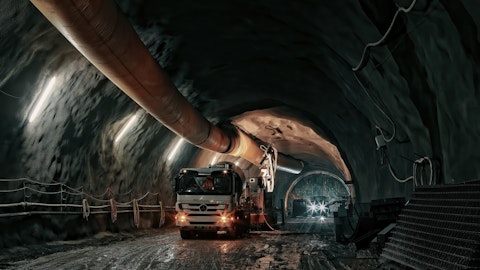So all I can tell you with regards to that is we continually and constantly are looking at scenario analysis with regards to that. I will tell you, we will not risk this company with regards to anything. And if we feel it’s prudent to pull out the levers, we will do so. But this time, we’re still in the works with regards to evaluating various scenarios that we have.
Craig Hutchison: All right. Perfect. Thanks guys.
Operator: The next question comes from Alex Terentiew of Stifel. Please go ahead.
Alex Terentiew: Hey, good morning guys. A couple of questions for me. First, the Xavantina mine grades in the quarter are really impressive. The Matinha vein, obviously, a good contributor to that. Were they higher than expected? And if so, any potential read through to 2024?
David Strang: So yeah, we got into Matinha early, and we did find some areas which the grade was significantly higher than what we anticipated, and that has been a positive benefit with respect to that. It’s too early to say right now where we will do with regards to Matinha. There’s some really interesting things that we’re seeing. But I don’t think any of us are going to change guidance with respect to what we think and with regards to Matinha right now. It’s a great start. We’re pretty excited. Our team is excited about what we’ve encountered. It has had a positive correlation. We continue to see higher grades than we anticipated. But we’re not going to change anything with regards to guidance nor thinking on it right now with respect to Matinha.
Alex Terentiew: Okay. Good. Well, it’s a good start anyways. Second question, at Furnas, you said greater than 240 holes drilled so far. That’s a lot of holes. So can I read into that then, I mean do you think you have enough information available already to put a 43-101 compliant resource together? And is that something we could expect over the next few months?
David Strang: We — so let’s talk about our work at Furnas. Over the — we have signed a binding letter of intent. We now move into negotiating a definitive agreement, both ourselves and Vale in terms of the team, each team’s work going into this letter of intent spent a lot of time. We have been in conversations with Vale for the last 18 months with regards to this. You can read that both companies are motivated with regards to getting the definitive agreement signed. That’s going to take a few months. At the same time, we are doing a baseline study and initiating a baseline study, environmental baseline study for the basis of our work that we will then be adding to the project. Thereafter, Mike and the team working with the Vale team will start our drilling programs.
We have a clear idea of what we want to do with regards to the drilling that will be supportive of the work that Vale has done in and of themselves. Vale has been working on this project a long time. Rules have changed with regards to QA/QC, and there’s a certain portion of the Vale database that needs to be updated, and that work will also be done. Hence, the reasons we’re taking a conservative approach with regards to discussing the project right now until such time as we can get everything — the I’s dotted and T’s crossed with regards to it being compliant with 43-101. So we will be working on this project over the course of the next 12 months with regards to getting it there. I can’t tell you when the 43-101 will be completed with regards to a resource.
We have to work with our partner, Vale, determine that. What you have seen in the definitive agreement business, an 18-month program that will be completed initially to generate a PEA on the project. And that’s what we will be working towards. If there’s opportunity, and we feel, along with our partner, Vale, that there’s an opportunity put out a 43-101 earlier, we will do that, but we’re going to be doing and working in partnership with Vale and moving this project forward.
Alex Terentiew: Okay. That is very helpful. Thank you.
Operator: The next question comes from Jackie Przybylowski of BMO Capital Markets. Please go ahead.
Jackie Przybylowski: All right. Thanks very much. A couple of questions for you and maybe one that’s on a slightly different subject. Can you give us an update on the PMA smelter? And how much of your material you’re selling domestically versus internationally right now?
David Strang: Thanks, Jackie. With respect to PMA, we did not make any sales during the quarter to PMA. PMA have had some maintenance issues with regards to the smelter and so I’ve been working through that. Eduardo De Come, as you know, our CEO here in Brazil has been working with PMA and the PMA has been very open with regards to working with us on potential solutions down the road. There has been interest with regards to various things. It’s not our role to get involved in this towards the PMA coming back on stream in a stronger, healthier position. And we remain because we are an interested party sitting on the sidelines and talking to various entities. There may be an opportunity to send some material to them this quarter, but we’re not relying upon it with regards to any of our projections that we will be selling anything to them in the fourth quarter.
Jackie Przybylowski: Okay. No, that’s helpful. And that’s consistent with the guidance you gave earlier. I just wanted to see if that was changed at all. I appreciate that. If I could ask one other question on — I guess it’s really related to the start-up of Tucuma, but just in general for the company. As we see Tucuma moving into production, can you talk a little bit about your working capital needs and how that may add to the amount of inventory and just sort of working capital that the company is going to need in general next year?
Makko DeFilippo: Yeah, Jackie, great question. So both myself and Wayne have had this discussion on numerous times over the past several months. We have — in terms of working capital draw for first production at Tucuma sales, we have a number of levers that we’re exploring to absorb that working capital impact. So we don’t anticipate a huge change with respect to working capital drawdown given some of the levers that we’re exploring at this stage.
Jackie Przybylowski: [indiscernible]
Wayne Drier: Yeah. I mean, Jackie, it’s Wayne here. Obviously, we’ve had initial indications on the concentrate coming out of Tucuma is pretty desirable spec. We’re in advanced discussions with various takers to enter into first year contracts around that. And obviously, there’s opportunity in those to manage our working capital needs.
Jackie Przybylowski: Sorry, Wayne, I didn’t mean to cut you off. Thank you very much, Wayne and Makko and David. Thanks for your answers.




